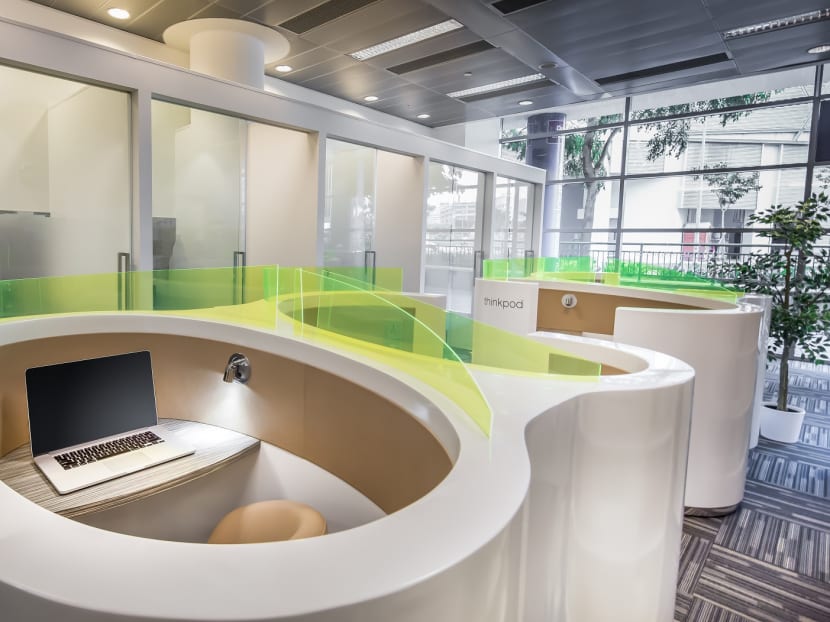Alternative workspaces taking off among Singaporeans
SINGAPORE — Instead of a cumbersome three-hour daily commute to and from his firm’s laboratory across the Causeway, Mr Preston Koh’s journey to his workplace now takes all of 10 minutes — on foot.

A Smart Work Centre, a workspace with secure Wi-Fi, printing and video-conferencing services for public use, will be built at Tampines Regional Library, in light of good reception to the concept. Such workspaces were opened in libraries in Jurong, Geylang East and Toa Payoh in 2014, and have served more than 1,500 people including entrepreneurs and freelancers. Photo: Regus
SINGAPORE — Instead of a cumbersome three-hour daily commute to and from his firm’s laboratory across the Causeway, Mr Preston Koh’s journey to his workplace now takes all of 10 minutes — on foot.
The marketing manager at the Asia Air Movement and Control Association has been working from the Smart Work Centre in the Toa Payoh Public Library — a stone’s throw from his home — since it was set up in 2014.
Smart Work Centres are alternative workspaces with professional facilities located in residential estates. Two other such centres are located in the Geylang East Public Library and the Jurong Regional Library, and a new one is slated to open in Tampines next year.
Mr Koh’s drastically shorter commute has reaped time savings, which are now spent on “productive work”.
Right now, he divides his time evenly between the Toa Payoh centre and his employer’s laboratory in Nusajaya, Johor, spending two or three days at each location weekly. “Rather than work from home, you go to a place where it’s professional,” he said, “(and) the mood is there.”
On the back of healthy demand, a fourth Smart Work Centre will be set up by the Infocomm Media Development Authority (IMDA) and the National Library Board (NLB) in the revamped Tampines Regional Library by the third quarter of next year.
Announced yesterday by Communications and Information Minister Yaacob Ibrahim at an inaugural conference on new ways to work, the 160sqm centre will be fitted with amenities such as secure Wi-Fi, as well as printing and video-conferencing services.
The NLB will put up a tender later this year to find an operator. The three existing Smart Work Centres are run by flexible workspace provider Regus, and they have seen utilisation rates of between 80 and 90 per cent since their launch in May 2014, the IMDA told TODAY. Each centre can accommodate 40 to 50 users at any given time, and so far, the three centres have served more than 1,500 unique users combined, from entrepreneurs to full-time employees.
Small-business owner Choo Hong Peng, 49, let go of his rented office space off MacPherson two years ago.
Ever since, his five-person cloud-based accounting software firm, Realtimme IT Consultancy, has distributed its operations across the three Smart Work Centres. The benefits have been palpable, with savings on expenses such as rental and housekeeping totalling more than S$3,000 a month.
Regus’ area director Sheena Goh noted the burgeoning demand for such workspaces. Her firm has seen membership for such spaces in Singapore double to about 3,000 over the past year, compared with the year before.
Members pay a S$99 monthly membership fee, before Goods and Services Tax (GST), that affords access to 27 Regus locations islandwide, including the three Smart Work Centres as well as Regus’ business lounges globally.
Separately, at a panel discussion at the conference yesterday, speakers — which included Minister of State (Manpower) Teo Ser Luck and human-resource (HR) practitioners — expressed the need for a certain degree of trust between employers and employees for flexible work arrangements to bear fruit.
Echoing the same sentiment in his speech at the conference’s opening, Dr Yaacob said a mindset shift was only possible with a culture of trust. “Instead of getting employees to clock hours, employers need to shift towards a more outcome-oriented approach. Employees, too, have to play their part in meeting work targets and expectations,” he added.








